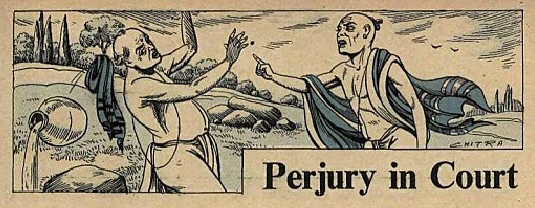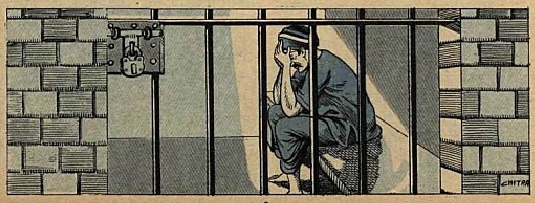Perjury In Court

It was a bright sunny day, and Ramesh idly strolled along the road back to his village. He was in a happy frame of mind because he had managed to sell his bullock cart for a reasonable price. The new owner was too short-sighted to notice that the bullocks were too old to pull even themselves along.
As he wended his way along the road, who should he meet but Narasing, the oil vendor, with a large jar of cooking oil balanced on his head.
“If that is good cooking oil you have, I will buy it,” said Ramesh, stopping the vendor. “What is the price?”
“You can have the whole jar for nine rupees,” replied the vendor.
“Nine rupees, you must be mad,” said Ramesh indignantly. “I will give you five rupees for the jar.”
“Why not offer one rupee and be done with it,” retorted the vendor, who was fed up with people haggling over his prices.
“I’ll stand no cheek from you,” shouted Ramesh, waving his walking stick under the vendor’s nose.
Poor Narasing, the vendor, tried to step back but, in doing so, stumbled and sat down on the ground with a thud. His precious jar of oil rolled into the ditch, splattering oil every. Where.
“Serves you right,” shouted Ramesh, and he walked, chuckling merrily.
A few minutes later, Arjun, a ne’er do well, who fondly believed there were easier ways of making money than working, came along the road and stopped when he saw the oil vendor sitting by the roadside and mourning his loss.
“What is the matter with you?” he asked.
Narasing told Arjun of his argument with Ramesh and how he lost all his oil.
“Wait a minute,” said Arjun thoughtfully. “You can easily get your own back on this, Ramesh. We will go to the magistrate and complain that Ramesh attacked and beat you with his stick. I will back your story, and then Ramesh will certainly be made to pay you damages.”
Narasing thought this would be fitting revenge, and the two conspirators, picking up the empty oil jar, eagerly wended their way to the village where Ramesh lived.
On the way, Arjun suggested that they share whatever damages were awarded, but in the meantime, Narasing should advance him five rupees as an act of good faith.
Narasing thought his newly found friend deserved the five rupees he gave him. Ramesh was sent for when they arrived at the magistrate’s court and lodged their complaint.
When Ramesh arrived at the court and listened to the story the two men recited, his face was a study. “It is all lies,” he shouted, getting very red.
The magistrate looked at Ramesh. “As there is a witness who swears that you brutally assaulted this oil vendor, you must pay for the loss and the injuries he sustained. So I order you to pay the man the sum of twenty rupees.”
When they left the court, Arjun lost no time asking Narasing for his share of the damages.
“But I have already given you five rupees,” said Narasing. “And I think that is ample payment, so be off with you.”
Arjun did not mean to take this lying down, so he ran after Ramesh, who was still muttering curses under his breath.
“I realise now that I did you a bad turn,” said Arjun, catching Ramesh by the arm. “But you can have your own back on that oil vendor if you wish. Return to the magistrate and swear that the oil vendor attacked you as you left court. I will say I witnessed the incident.”
Ramesh was so mad at the oil vendor that he readily agreed to Arjun’s plausible suggestion. So back to the court, they went and spun a blow-by-blow account of the oil vendor’s murderous attack on Ramesh.
The magistrate listened patiently to this lurid story, then sent an officer to bring the oil vendor back into court.
When the oil vendor appeared, the magistrate seemed quite content to sit back in stony silence and listen to the three men give their version of what had occurred.
Now this magistrate was allergic to lies. Just as some people break out into a rash if they come near a cat or a strawberry, so did deliberate untruths revolt against the magistrate. He had heard far too many lies in his time and was heard far too many now.
Banging his fist on his bench, the magistrate glared at the three men. “I have listened to two cases involving you three men. And in both cases, there has been perjury.”
“But I assure you,” stated Ramesh.
“Sit down,” intervened the magistrate. “You are all guilty of telling lies. You, Ramesh, and Narasing are fined fifty rupees for committing perjury. And as for you, Arjun, you are the main culprit, and it is my pleasure to award you six months imprisonment.
